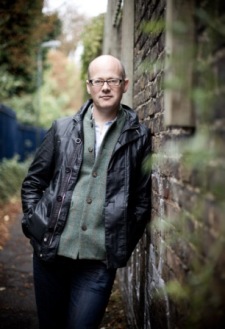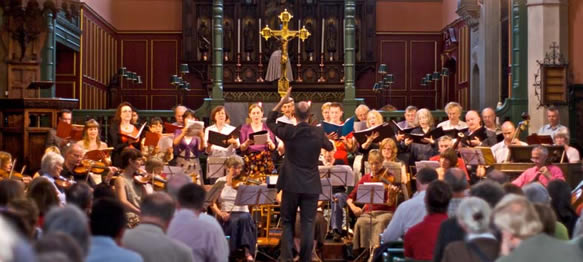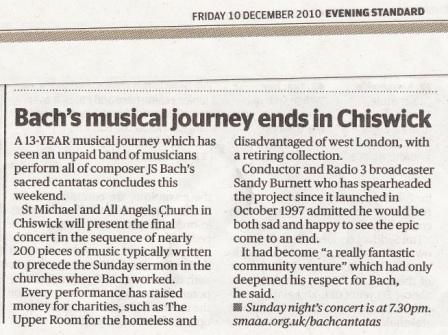
Bach Cantatas at St Michael & All Angels
 West London Bach Consort and Players
West London Bach Consort and Players
October 2011 saw two sacred Bach events centred around the St John Passion at St Michael and All Angels Church in Bedford Park, following in the footsteps of the long-running Bach sacred cantata cycle which took place there from 1997-2010.
At 8:00pm on Thursday 13th October in the Michael Room, conductor and broadcaster Sandy Burnett discussed JS Bach's St John Passion, one of the greatest religious works in the repertoire of classical music.
"We think of Bach first and foremost as a supreme musical craftsman," Sandy writes, "but the
standout feature of this piece isn't the music - it's the way he puts his astonishing musical skills entirely at the service of the Passion story. This is a gripping, at times terrifying, narrative - for me the way Bach illuminates the account in John's Gospel of Jesus's betrayal, trial, crucifixion and death is more vivid than any other musical work before or since."
Sandy approached the masterpiece from several different angles:
- where the Passion tradition came from.
- how the St John Passion was originally intended to be performed
- the way Bach structured the piece
- the spiritual qualities of the music
- its exceptional dramatic power.
This was the first in a series of Classic Discovery events designed to introduce classical music to intelligent people, and to deepen the knowledge of those who are already cognoscenti. Tickets cost £10
Three days later, at 8:00pm on Sunday 16th October 2011, there was a complete performance of Bach's St John Passion BWV 245 in St Michael and All Angels Church, Chiswick, London W4 1TT, as part of the ongoing sacred Bachseries there.
The soloists included Guy Cutting, Lisa Rijmer, Jeremy Collin
and Paul Sheehan, and Sandy Burnett conducted the West London Bach Consort and Players. Admission was free; there was a retiring collection in aid of the Upper Room, which feeds and supports the community in need in West London. Charity registration no. 1004354.
The next event in this series will be the performance of Bach's St Matthew Passion to be held on Sunday February 5th at 7.30pm in St Michael and All Angels Church
West London Bach Consort and Players - 2010
After 13 years, the West London Bach Players and Consort, conducted by Sandy Burnett (right), have completed their epic performing cycle of J.S. Bach’s sacred cantatas* at St Michael & All Angels. The hour-long concerts have been free, with a retiring collection for projects at the Upper Room (infoupperroom@yahoo.co.uk).
The project was further celebrated with a performance in the Church of
Bach's Mass in B Minor on Sunday February 6th at 7.30pm.
Sandy talks about the Cantatas on YouTube, writes below and blogs at: http://sandyburnett.posterous.com/.
End of an era: the final Bach Cantatas 7.30pm, Sunday 12th December 2010
It’s the end of an era for the West London Bach Consort and Players – their concert of Bach’s cantatas at 7:30pm on Sunday 12th December at St Michael and All Angels Church, Bath Road, Chiswick, London W4 represents the final step in a long musical journey that began right back in October 1997. The mission – to perform all of Bach’s surviving sacred cantatas – has meant several concerts each year, huge amounts of work from an unpaid army of volunteers, enormous amounts of score study and planning, and hundreds upon hundreds of hours of practise.
“Johann Sebastian Bach has always been a favourite composer of mine,” says the group’s music director Sandy Burnett, “but I have even more respect for him than I did 13 years ago. The experience of absorbing myself in his music for month after month has really brought home to me what an outstanding musician he was. The quality of his musical inspiration is consistently high – something that’s not always true about the other great classical composers. For some of the concerts I’ve had to step into Bach’s shoes and complete some of the cantatas for which some of the music has gone missing, and that’s been a tough experience which has left me with renewed respect for his craft as a composer! But for me the single most important thing to be aware of is not the excellence of the music, but what it says spiritually.
Bach generally wrote this music to go hand in hand with the Sunday sermon – when the cantata ended, the sermon would begin. The cantatas often took an aspect of the Gospel of the Day as their starting point. And what I believe Bach set out to do was to use music to take the message further than mere words could, and allow the congregation to experience the spiritual message on a different level. His settings are full of striking musical metaphors – low repeated semiquavers to represent earthquakes, pairs of slurred semiquavers to represent yearning and so on. Remarkable though these effects are, and stunning though the music is, they are there for one reason only: to highlight the Christian message.”
The two final remaining cantatas in the West London Bach cycle are Jesu, der du meine Seele BWV 78 and Nun komm, der Heiden Heiland BWV 62. In the opening movement of BWV 78, Bach places each phrases of the chorale in a solemn instrumental context of a passacaglia, with strong shades of Henry Purcell to British ears. And he follows it with something quite different : one of his most tuneful duets, for soprano and alto on top of a pizzicato bass line. BWV 62 is the second of two cantatas Bach wrote on Martin Luther’s hymn Nun komm, der Heiden Heiland. The “saviour of the heathen” mentioned in the title comes to life most vividly in the tenor aria. Bach sets the words “höchste Beherrscher” to virtuosic runs of notes which are appropriately high and heroic – a good example of music and text going hand in hand.
Antonia Cviic (soprano), Clare McCaldin (alto), Tom Cragg (tenor) and Paul Sheehan (bass) are this month’s soloists; and the West London Bach Consort and Players (leader Miranda Wilson) are conducted by Sandy Burnett. A retiring collection will raise money for the Upper Room. After the concert, there will be an end of cycle party to which all audience members and all performers past and present are warmly invited.
The penultimate concert - Sandy Burnett writes:
Bach cantatas at 7:30pm on Sunday 7th November 2010
In the penultimate concert of his Bach cantata cycle at St Michael and All
Angels in Bedford Park, Sandy conducts BWV 139 Wohl dem, der sich auf seinen
Gott and BWV 102 Herr, deine Augen sehen nach dem Glauben - two wonderful
and contrasting works.
"O Lord, do not your eyes look for truth? You struck your people, but they
felt no pain; you crushed them, but they refused correction. They made their
faces harder than stone, and refused to repent." These words from the Old
Testament book of Jeremiah set out the stall for BWV 102, a stern warning to
stubborn sinners everywhere. Rarely is the text of a Bach cantata as
persistently dark as this, with vivid music to match; the alto aria's
opening "Weh" or "woe" begins on a dissonant high D flat, while the tenor
sings the words "Erschreke doch" or " be terrified" to a disjointed vocal
line that seems to be convulsed with fear.
BWV 139 on the other hand is predominantly good-natured. It takes the
well-known encounter between Jesus and the Pharisees as its starting point -
the exchange in which he told them to "render unto Caesar the things which
are Caesar's and unto God the things which are God's." The fourth movement
of this cantata is extremely unusual, with around ten changes of tempo in
the space of a single bass aria.
Gill Hallifax (soprano), Lucy Ballard (alto), Jake White (tenor) and
Jonathan Saunders (bass) are the soloists, with Sandy Burnett conducting the
West London Bach Consort and Players (leader Miranda Wilson). Incredibly
enough, our complete performing cycle of Bach cantatas which began in
October 1997 reaches its conclusion next month.
All performers in this cantata cycle, in which Sandy Burnett conducts the West London Bach Consort and Players give their services for free. There is no charge for admission, but there will be a retiring collection in aid of the Upper Room.
There’s more info on Sandy's blog - http://sandyburnett.posterous.com/
*2010 dates and performances
Date |
Cantatas |
Title |
|
9th May |
BWV 41 BWV 79 |
Jesu, nun sei gepreiset Gott der Herr ist Sonn und Schild |
|
13th June |
BWV 30 BWV 118 |
Freue dich, erlöste Schar O Jesu Christ, meins Lebens Licht |
|
11th July |
BWV 170 BWV 16 |
Vergnügte Ruh, beliebte Seelenlust Herr Gott, dich loben wir |
|
12th Sept |
BWV 173 BWV 98 BWV 181 |
Erhöhtes Fleisch und Blut Was Gott tut, das ist wohlgetan Leichtgesinnte Flattergeister |
|
10th Oct |
BWV 19 BWV 190 |
Es erhub sich ein Streit Singet dem Herrn ein neues Lied |
|
7th Nov |
BWV 139 BWV 102 |
Wohl dem, der sich auf seinen Gott Herr, deine Augen sehen nach dem Glauben |
|
12th Dec |
BWV 78 BWV 62 |
Jesu, der du meine Seele Nun komm, der Heiden Heiland |
West London Bach Consort & Players
conducted by Sandy Burnett/*Giles Ridley

The Millennium Project - Spiritually satisfying, technically challenging, musically edifying, and always surprising!
In October 2007, on the tenth anniversary of the project, Sandy Burnett wrote: Working on a complete performing cycle of Bach’s surviving sacred cantatas with the West London Bach Consort and Players has been an absorbing experience on a number of levels. It is a musical journey that we began early in 1997; it has at times seemed like a never-ending pilgrimage, but as things now stand (October 2007), a mere twenty-five concerts remain before the cycle is complete in December 2010.
Which cantatas will be performed when is a task undertaken by one of the project’s guiding lights, cellist Ruth Ridley. She has eschewed the electronic advantages of the computer to draft out the schedule using a medium that Bach himself would have recognised, namely pencil and paper.
Our performances generally take place in St Michael’s on the second Sunday of each month, starting after Easter and continuing through until December. There is no performance in August, and the November concert takes place on the first Sunday due to Remembrance Sunday, which falls the week after.
Bach composed these extraordinary works at the rate of approximately one a week, often with the objective of illustrating and amplifying the spiritual message of the chief Sunday morning Lutheran church service, the Hauptgottesdienst. For our Chiswick cycle we are presenting Bach’s cantatas in sacred Sunday-evening concerts. Although the cantatas are sung in German, and some of the imagery can seem obscure, we precede each of the cantatas with spoken introductions which unlock some of the mysteries of the language! - while the vivid power of Bach’s music ensures that the central spiritual message of these cantatas, written almost 300 years ago, are just as direct and relevant today.
The concerts begin at 7:30 and last for under an hour; all performers give their services for free. There is no charge for admission, but as in previous years there will be a retiring collection for projects supported by the Upper Room, feeding the community in need in West London. Whether you are new to these concerts, or one of the growing band of regular audience members, you will be very welcome and we look forward to seeing you there.
ADMISSION FREE. Retiring collection for projects supported by the Upper Room, feeding the community in need in West London.
Charity registration no. 1004354. Email: infoupperroom@yahoo.co.uk
